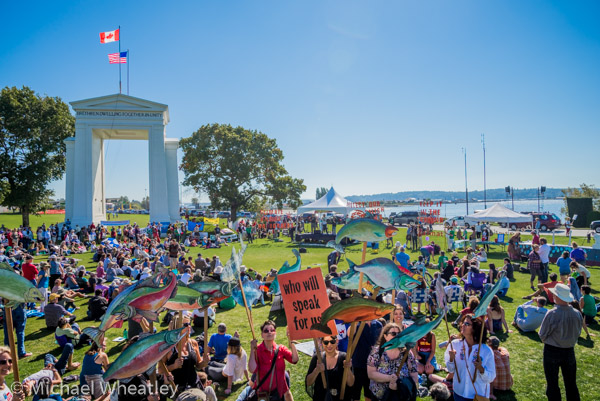
Over 700 citizens from both sides of the U.S./Canadian border met in Peace Arch State Park in Blane on Saturday for the “Climate Change Knows No Borders: Defense of the Salish Sea Is Without Boundaries” rally, which was sponsored by 350 Seattle, Georgia Strait Alliance, and the Wilderness Committee.
Sundance Chief Rueben George of the Tsleil-Waututh Nation spoke to the enthusiastic and boisterous crowd, as well as Master Carver Jewell James of the Lummi Nation, Alexandra Woodsworth of the Georgia Strait Alliance, Sarra Tekola of UW Divest, and Lynn Fitz-Hugh of 350 Seattle.
“We stand as one, and together we will protect and restore the sacredness of the Salish Sea,” said Sundance Chief Rueben George of the Tsleil-Waututh Nation. “Together, we are stronger than those who wish to use our home and waters as a mere highway for dirty oil and coal–and together, we will stop them.”
Sarra Tekola from UW Divest said in her speech that “As a young black woman and a second generation immigrant, fighting climate change isn’t a choice. It is an obligation and a duty to protect not only my rights but my communities and the generations after me.”
Added Lynn Fitz-Hugh of 350 Seattle, “We are coming together on this border to tell our political leaders and the members of the UN that the time for posturing and endless talking is over. The time for action is now…and if they won’t lead, we will.”
The rally was created in solidarity with the massive People’s Climate March in New York City on Sunday, which drew 400,000 people, and was part of the Four Days of Action campaign aimed at protecting the Salish Sea. This campaign, organized and led by the Nawtsamaat Alliance, hopes to mobilize local citizens to help stop the large increase in fossil fuel projects in the Pacific Northwest and increase awareness of the risks and threats to the Salish Sea from the proposed Kinder Morgan Trans Mountain Pipeline expansion in British Columbia, as well as the other fossil fuel threats in the region, including oil trains, coal trains and tankers.
In the Pacific Northwest, there are currently active proposals for five new coal terminals, three new oil pipelines, as well as six new natural gas pipelines. Together, these projects are capable of shipping an enormous amount of fossil fuels, which when burned would release 761 million metric tons of carbon dioxide into the atmosphere each year. This would be twelve times the amount of carbon dioxide emissions that Canada as a country currently emits each year, or 76 coal-fired power plants.
The occasion also marked the official launch of the Pledge to Save the Salish Sea, a campaign that calls on pledgers to act at critical moments to stop key projects and push for climate leadership in the region, organize cross-border delegations to speak to politicians and other decision makers and help organize future rallies.
Participants ended the rally in a ceremony of commitment to protect the Salish Sea by joining hands across the border.
Author’s Note: The event was co-sponsored by 350 Bellingham, the Nawtsamaat Alliance, Washington Environmental Council, Backbone Campaign, PIPE UP Network, Sierra Club BC, LeadNow, Climate Solutions, Faith Action Network, Friends of the Earth, Sierra Club, and Greenpeace.



